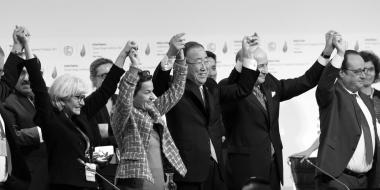The Paris Agreement brings the promise of climate resilient markets and an environment of certainty and opportunities.

Saturday 12 December 2015 will be remembered as the day that changed the rules of the game, when 195 nations agreed to limit warming to “well below 2°C ... and to pursue efforts to limit the temperature increase to 1.5 °C above pre-industrial levels.”
The Paris Agreement is a truly momentous step towards addressing climate change, and it has significant implications for businesses and markets. Despite this, PwC’s briefing predicts that the deal will not impact share prices in the short term. Instead the impacts will be felt through Nationally Determined Contributions (NDCs) which will use subsidies for renewables and other incentives to shift capital towards low carbon development and technologies.
The deal is not perfect, but it is the best possible outcome of the 2 weeks of negotiations. It is widely agreed that current NDCs would not limit us to a 2˚C increase in global temperature. The 5-yearly reviews outlined in Article 4 of the Agreement aim to address this by allowing evaluation of progress and raising of ambition where necessary.
However, the Paris Agreement will change the status quo and it is time for every market actor to decide whether to turn this challenge into an opportunity. Leading businesses and investors around the world have already started their transformation into future-proof enterprises through various commitments declared in the build up to the conference. And clear, effective, transparent disclosure of environmental and climate-related information was widely recognised as the way to ensure that this is set into motion. The announcement of the Climate Disclosure Task Force by Mark Carney and Mike Bloomberg during the conference demonstrated how vital this is seen to be by the financial and commercial sectors. The CDSB Framework was regularly cited as the "go-to" method for disclosing this information in mainstream reports, with the same rigour as reporting financial information.
Promoting the leadership of the signatories to the Statement on fiduciary duty & climate change disclosure was a key part of our presence at the negotiations. At that point over 140 companies with a market capitalisation of US$ 2 trillion and investors with US$ 7.2 trillion of assets under management had signed the Statement. Leading organisations such as Autodesk, H&M and CLP publicly stated that climate change has important implications for economic activity and therefore corporate performance. To address this, they pledged to report climate change-related information on a consistent basis in their mainstream reports. This commitment signaled a positive parallel agenda by the private sector, giving confidence to negotiators that business was supportive of a strong deal in Paris.
At CDSB, we will continue the work to support the transition to more sustainable economic, social and environmental systems by advancing and aligning corporate environmental reporting, with that of financial reporting.
We believe that mainstream corporate reporting on climate change will play a crucial role in the transition started by the Paris Agreement. Consistent, clear and comparable information on corporate climate change performance will become a key part of the dataset that markets will operate on, alongside financial performance.
The deal in Paris was a historic step in the right direction, but the real work of implementing what was agreed is still ahead of us. In this tremendous task lies the biggest opportunity, to transform the way businesses operate. We should seize this opportunity, driving the world to move closer to sustainable economic, social and environmental systems.